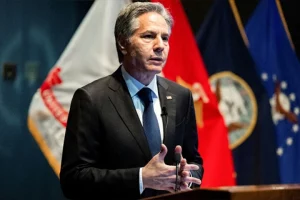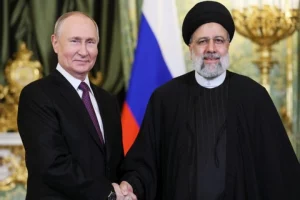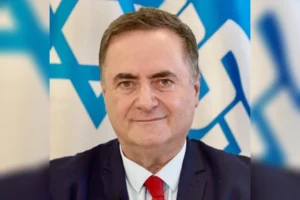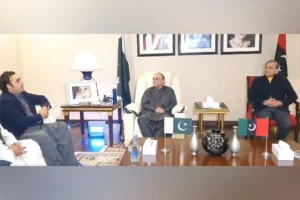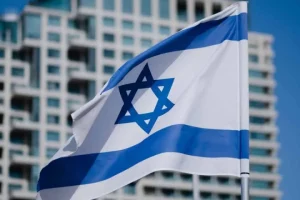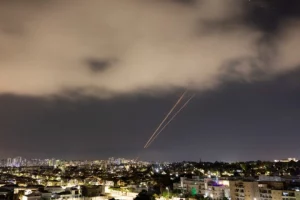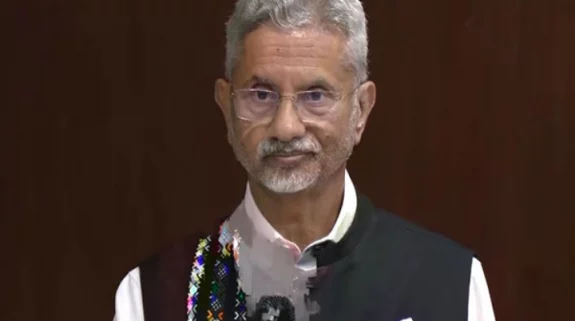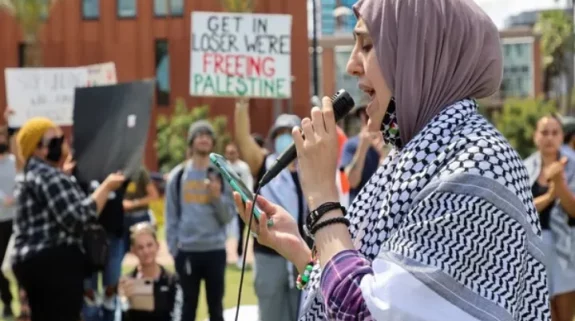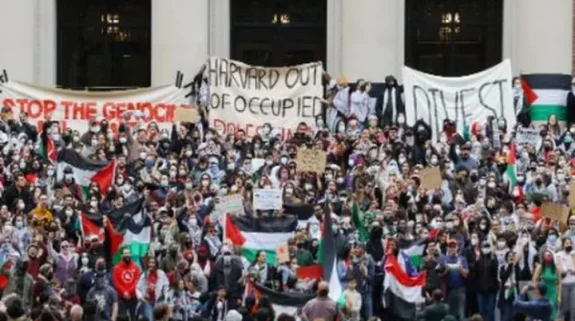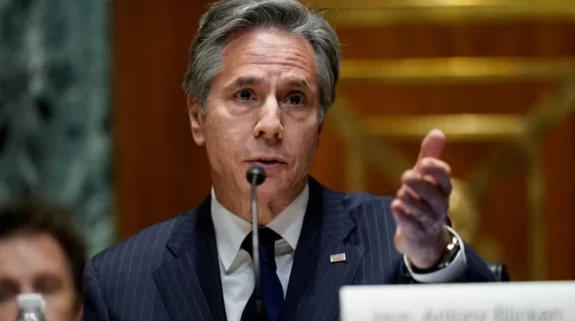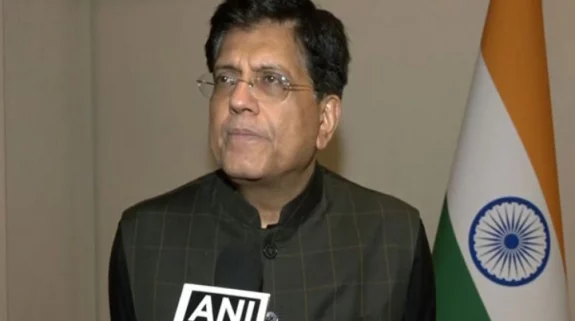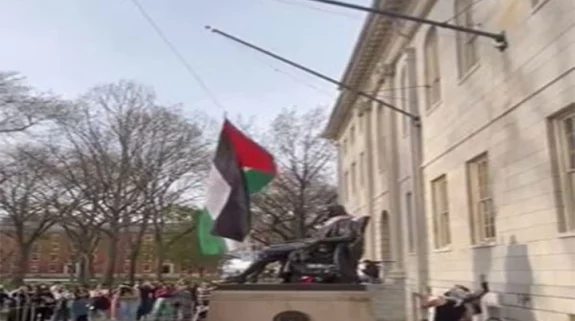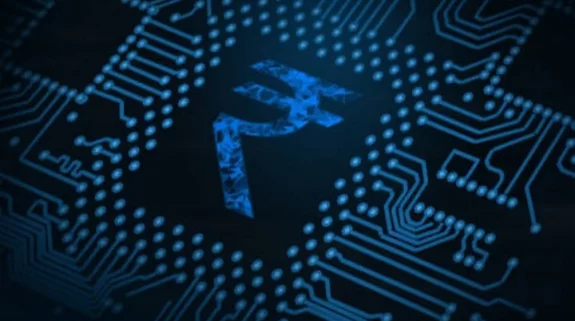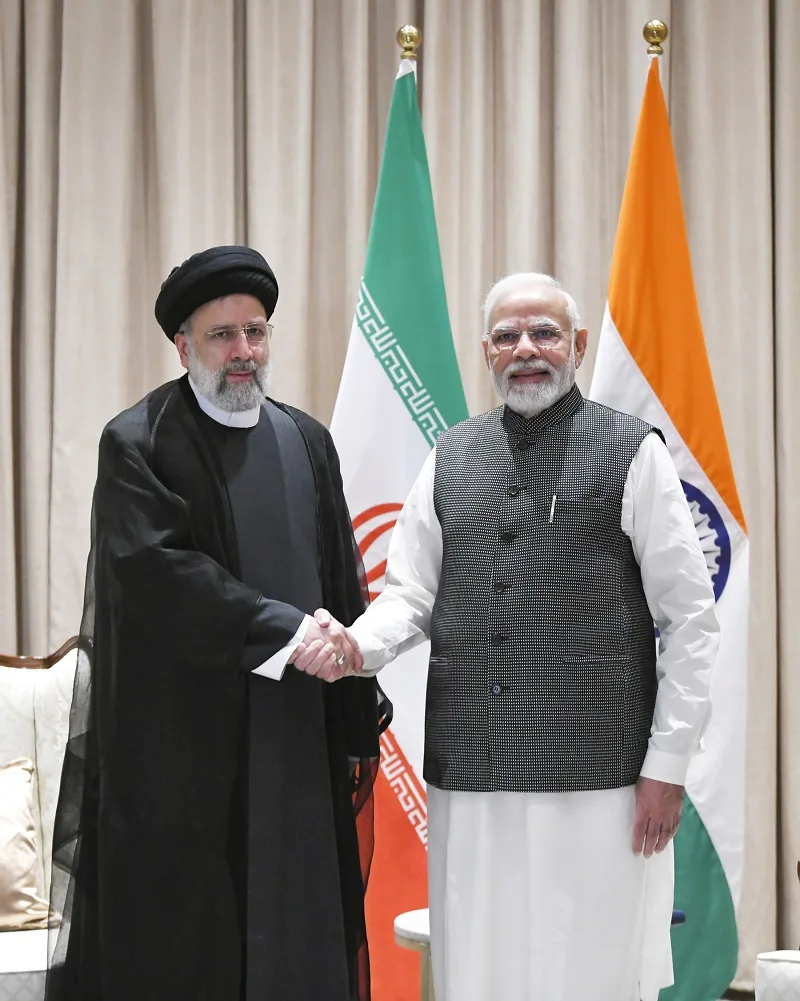
Prime Minister Narendra Modi with Iranian President Ebrahim Raisi in Samarkand (Image courtesy: PIB)
Prime Minister Narendra Modi’s phone call with Iranian President Seyyed Ebrahim Raisi on Friday comes at a crucial juncture as both leaders get ready to meet in Johannesburg next week on the sidelines of the forthcoming BRICS summit in South Africa.
With PM Modi maintaining that strong connectivity is crucial for the progress of any region as it not only enhances mutual trade but also fosters mutual trust, the two leaders discussed in detail measures to realise the full potential of Chabahar Port as a connectivity hub.
The strategic port, being built with India’s help in Iran, has been a symbol of cooperation between the two countries since India Ports Global Chabahar Free Zone (IPGCFZ) took over the operations of the Shahid Behesti Terminal of Chabahar Port in December 2018.
Besides making efforts to make it as a commercial transit hub for the landlocked countries of Central Asia, New Delhi has also been utilising the port to ship lakhs of tonnes of wheat and pulses as humanitarian food assistance to Afghanistan since 2020, especially during the Covid-19 pandemic.
Earlier this week, India collaborated with the United Nations World Food Programme (UNWFP) to send 47,500 metric tonnes of wheat to Afghanistan via Chabahar.
For the first half of this year, 16 million people in #Afghanistan received life-saving food from WFP.
We are grateful for generous donors like #India who make that happen. 🙏@MEAIndia@Dpa_mea pic.twitter.com/zwsdiaY8UL
— WFP Afghanistan (@WFP_Afghanistan) August 15, 2023
Calling Chabahar Port and its development and transformation into a regional transportation hub as an opportunity for the prosperity of the region, both leaders expressed readiness to finalise the cooperation documents between the two countries in order to complete the project.
“The President described it important to develop interactions with India, especially in the fields of transit and energy and regional security, and demanded the development of transportation cooperation, including in the North-South Corridor, and the acceleration of the operationalization of Chabahar Port facilities,” said a statement issued by Raisi’s office.
The Iranian President also mentioned that Tehran wants to strengthen regional integration and develop economic relations, and in this regard, seeks interaction with all countries of the world, especially Asian countries.
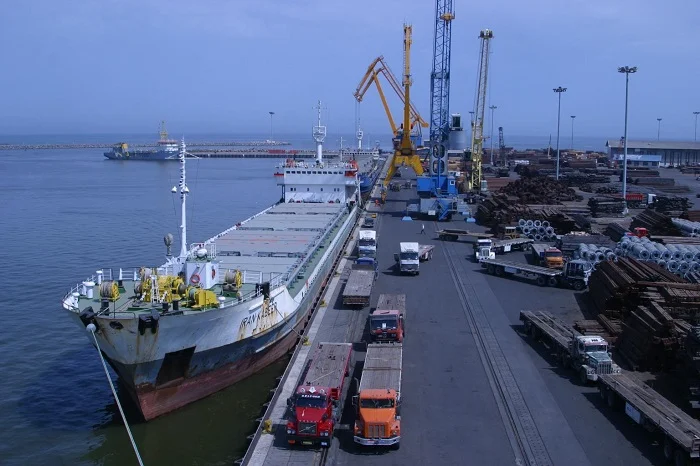
Acknowledging India’s growth as an emerging power, Tehran has now urged New Delhi to accelerate the process of Iran’s admission to the powerful five-member BRICS grouping that includes Brazil, Russia, India, China, and South Africa.
In July, Iran – an observer state till now – got a full membership of the Shanghai Cooperation Organisation (SCO) under the rotating chairmanship of India.
The Johannesburg summit, scheduled to be held from August 22 to 24, will be the first in-person gathering of BRICS leaders since 2019. Besides PM Modi, it will be attended by Presidents of Brazil, China and hosts South Africa while Russian President Vladimir Putin will be represented by Foreign Minister Sergei Lavrov.
Prime Minister Modi will also participate in a special event ‘BRICS – Africa Outreach and BRICS Plus Dialogue’ being organised after the BRICS Summit, which will include other countries invited by South Africa.
During the summit, PM Modi is expected to further carry forward his vision of utilising India’s current G20 presidency to give resonance to the voice of the Global South and the importance of South-South Cooperation to collectively shape the global agenda.
On Friday, during their phone call, PM Modi and Raisi discussed cooperation at multilateral forums, including expansion of BRICS.
BRICS members have already intensified discussions on the expansion process, setting a course for the further development of cooperation between the ‘five’ and interested developing countries in the ‘outreach’ and ‘BRICS Plus’ formats.
Even though the grouping still has to decide regarding the actual launch of the expansion, Saudi Arabia’s growing interest in BRICS is already signalling a major change in the geopolitical architecture of the region
Iran, another country having major natural gas reserves, has already made its intentions clear on joining BRICS, saying the economics bloc has been able to shape new trends in the world by providing appropriate models and initiatives.
In June 2022, Iran’s Foreign Minister Hossein Amirabdollahian sent a letter to his counterparts in the five-member BRICS countries, expressing Tehran’s readiness to join the group that owns in excess of one fifth of the world’s gross domestic product, brings together some 3.2 billion people and is among the largest bloc of countries in terms of population and territory.
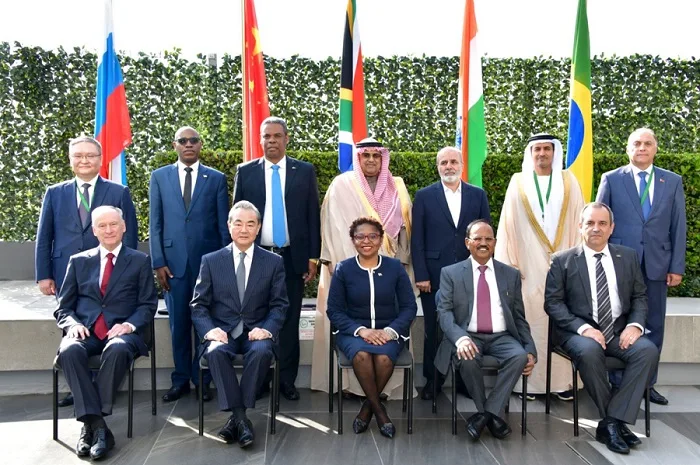
Last month, as Cape Town hosted foreign ministers of the BRICS and ‘Friends of BRICS’, Amirabdollahian again spotlighted that Iran enjoys abundant potentialities and capacities such as bountiful sources of energy, unique connectivity, skillful human resources and hi-tec knowledge-based enterprises which would bring remarkable added value to BRICS.
The minister mentioned that the number of the countries interested in joining BRICS, some of whom were present in the Cape Town meeting, is well suggestive of the increasing significance and relevance of the objectives and goals pursued by the BRICS.
“As I highlighted in my statement to the Friends of BRICS, an extended BRICS, can present to the world an effective pattern and competent model of collective and inclusive governance, new South-South cooperation and coalition of emerging economies—patterns and models which will definitely play a role in correcting the present global systems,” said Amirabdollahian.
As reported by IndiaNarrative.com, Iran’s new security chief Ali Akbar Ahmadian also discussed the matter in detail last month during his meeting with National Security Advisor (NSA) Ajit Doval at the BRICS NSA and ‘Friends of BRICS’ gathering in Johannesburg that was also attended by national security secretaries and advisors of Iran, Burundi, Egypt, Cuba, Saudi Arabia, Kazakhstan, UAE and Belarus.
Iran is hoping that the membership mechanisms of BRICS-friendly countries will be defined and implemented as soon as possible.
Also Read: Russia promises to remove all hurdles choking new route linking Saint Petersburg with Mumbai






